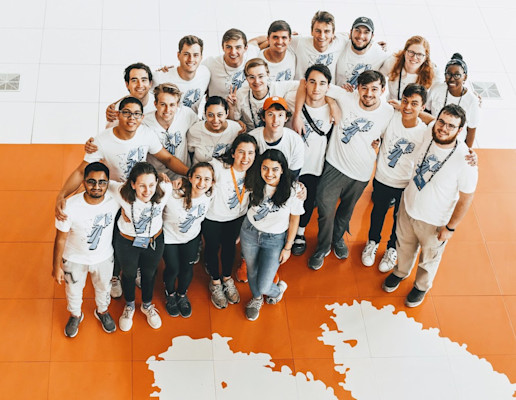Natalie DellaMaria, 22

During Natalie’s freshman year of college, she switched her major several times from engineering to biology to pre-physical therapy, and finally to computer science. While she had just made the best decision of her life, it didn’t feel that way at first. At the start of her sophomore year, she questioned her choice. She felt out of place and had no friends in her classes. Normally an outgoing person, she found herself sitting in the back of the classroom, afraid to participate, and too intimidated to talk to her peers. Her older brother was in the same major and encouraged her to continue at it. He promised her that there was a community of smart, funny, kind, and empowering individuals who are passionate about technology; that she would find her place in the community if she worked hard and kept an open mind. This seemed unlikely as she looked around the classroom and found a predominantly awkward group of men. Although skeptical, she persisted.
Then she met Courtney. Courtney was a year older than her in her major. They were both a part of the honors college and were connected through mutual friends. Courtney became a role model for Natalie. She was smart, a runner, and had social gatherings at her house. She was also extremely passionate about programming. For the first time, Natalie began to have hope that she would find others like her in the field.
Courtney mentioned how she had gotten funding from their school to fly to San Francisco to attend a ‘hackathon’ last year. She spoke of wanting to bring one to Clemson. As a first-semester sophomore in a new major, Natalie was still looking for ways to get involved. She had been leading outdoor adventure trips for the school’s recreation department but wanted to do something related to her major and career goals. When Courtney mentioned how she had been thinking about organizing a hackathon at Clemson, Natalie jumped on board despite not knowing what a hackathon was.
Determined to find that community her brother promised, she started recruiting other students to join the planning committee. Very early into their planning stages, they realized their group was lacking in one fundamental area of expertise: what a hackathon actually was. Out of the six of them, Courtney was the only one who had ever been to a hackathon. So one spontaneous Tuesday, four of them including Courtney, cleared their calendars for the upcoming weekend and registered to attend HackNC. They left at 6 am on Saturday. Little did Natalie know how this weekend would impact not only her entire college experience but also her future goals and career path.
HackNC was everything and more. They made friends, went for a walk at 2 AM and got chased by deer. Natalie learned how to make a website and learned what Soylent was. At the end of the weekend, they were exhausted but mostly excited at what they had to look forward to. This was the community she had been promised and boy, did they deliver.
They spent the five-hour drive back talking about project ideas for their next hackathon and planning Clemson’s first-ever CUhackit. In the two years since Natalie was introduced to the hackathon community, she has attended seven hackathons in six different states from Georgia to Massachusetts to California. She’s helped to organize four: the first student-led hackathon in South Carolina, the largest hackathon in South Carolina, and two hackathons for Clemson freshmen. In addition to planning CUhackit 2020, Natalie is working with a faculty member who is doing research at Botho University in Botswana on a Fulbright to expand the hackathon community on a global scale and put on the first-ever hackathon in Botswana.
In addition to her hackathon activity, Natalie wants to make the tech community more inclusive. As part of an outreach initiative she started at CUhackit, Natalie has been working to include younger students. The local high school recently stopped teaching AP Computer Science A and the faculty lacked the proper background to teach it. She has helped to create opportunities for Clemson hackers to volunteer at the high school and introduce students to technology and programming through demonstrations and workshops. Also, she has started a chapter of Girls Who Code at the high school and formal meetings began in January 2020.
Outside of Clemson, Natalie volunteers for Future Engineers, an afterschool program to excite elementary school students about STEM disciplines through hands-on project experiences. Upon graduating from Clemson in the spring, Natalie will be starting a job as a full-time software engineer at Samsara next fall.
Her favorite hackathon project is called FemmeCare and it allows one to easily and continuously donate to a nonprofit focused on women’s issues. Each user creates a profile and enters their bank account information. They would then choose a nonprofit from a provided list chosen of their contributions to women’s empowerment and health. Every time a user makes a payment, the difference between the payment and the next whole dollar amount is automatically donated to their currently selected nonprofit. This project won a prize for the best use of API and storage.
Quick Facts

Natalie DellaMaria, 22

During Natalie’s freshman year of college, she switched her major several times from engineering to biology to pre-physical therapy, and finally to computer science. While she had just made the best decision of her life, it didn’t feel that way at first. At the start of her sophomore year, she questioned her choice. She felt out of place and had no friends in her classes. Normally an outgoing person, she found herself sitting in the back of the classroom, afraid to participate, and too intimidated to talk to her peers. Her older brother was in the same major and encouraged her to continue at it. He promised her that there was a community of smart, funny, kind, and empowering individuals who are passionate about technology; that she would find her place in the community if she worked hard and kept an open mind. This seemed unlikely as she looked around the classroom and found a predominantly awkward group of men. Although skeptical, she persisted.
Then she met Courtney. Courtney was a year older than her in her major. They were both a part of the honors college and were connected through mutual friends. Courtney became a role model for Natalie. She was smart, a runner, and had social gatherings at her house. She was also extremely passionate about programming. For the first time, Natalie began to have hope that she would find others like her in the field.
Courtney mentioned how she had gotten funding from their school to fly to San Francisco to attend a ‘hackathon’ last year. She spoke of wanting to bring one to Clemson. As a first-semester sophomore in a new major, Natalie was still looking for ways to get involved. She had been leading outdoor adventure trips for the school’s recreation department but wanted to do something related to her major and career goals. When Courtney mentioned how she had been thinking about organizing a hackathon at Clemson, Natalie jumped on board despite not knowing what a hackathon was.
Determined to find that community her brother promised, she started recruiting other students to join the planning committee. Very early into their planning stages, they realized their group was lacking in one fundamental area of expertise: what a hackathon actually was. Out of the six of them, Courtney was the only one who had ever been to a hackathon. So one spontaneous Tuesday, four of them including Courtney, cleared their calendars for the upcoming weekend and registered to attend HackNC. They left at 6 am on Saturday. Little did Natalie know how this weekend would impact not only her entire college experience but also her future goals and career path.
HackNC was everything and more. They made friends, went for a walk at 2 AM and got chased by deer. Natalie learned how to make a website and learned what Soylent was. At the end of the weekend, they were exhausted but mostly excited at what they had to look forward to. This was the community she had been promised and boy, did they deliver.
They spent the five-hour drive back talking about project ideas for their next hackathon and planning Clemson’s first-ever CUhackit. In the two years since Natalie was introduced to the hackathon community, she has attended seven hackathons in six different states from Georgia to Massachusetts to California. She’s helped to organize four: the first student-led hackathon in South Carolina, the largest hackathon in South Carolina, and two hackathons for Clemson freshmen. In addition to planning CUhackit 2020, Natalie is working with a faculty member who is doing research at Botho University in Botswana on a Fulbright to expand the hackathon community on a global scale and put on the first-ever hackathon in Botswana.
In addition to her hackathon activity, Natalie wants to make the tech community more inclusive. As part of an outreach initiative she started at CUhackit, Natalie has been working to include younger students. The local high school recently stopped teaching AP Computer Science A and the faculty lacked the proper background to teach it. She has helped to create opportunities for Clemson hackers to volunteer at the high school and introduce students to technology and programming through demonstrations and workshops. Also, she has started a chapter of Girls Who Code at the high school and formal meetings began in January 2020.
Outside of Clemson, Natalie volunteers for Future Engineers, an afterschool program to excite elementary school students about STEM disciplines through hands-on project experiences. Upon graduating from Clemson in the spring, Natalie will be starting a job as a full-time software engineer at Samsara next fall.
Her favorite hackathon project is called FemmeCare and it allows one to easily and continuously donate to a nonprofit focused on women’s issues. Each user creates a profile and enters their bank account information. They would then choose a nonprofit from a provided list chosen of their contributions to women’s empowerment and health. Every time a user makes a payment, the difference between the payment and the next whole dollar amount is automatically donated to their currently selected nonprofit. This project won a prize for the best use of API and storage.
Quick Facts




